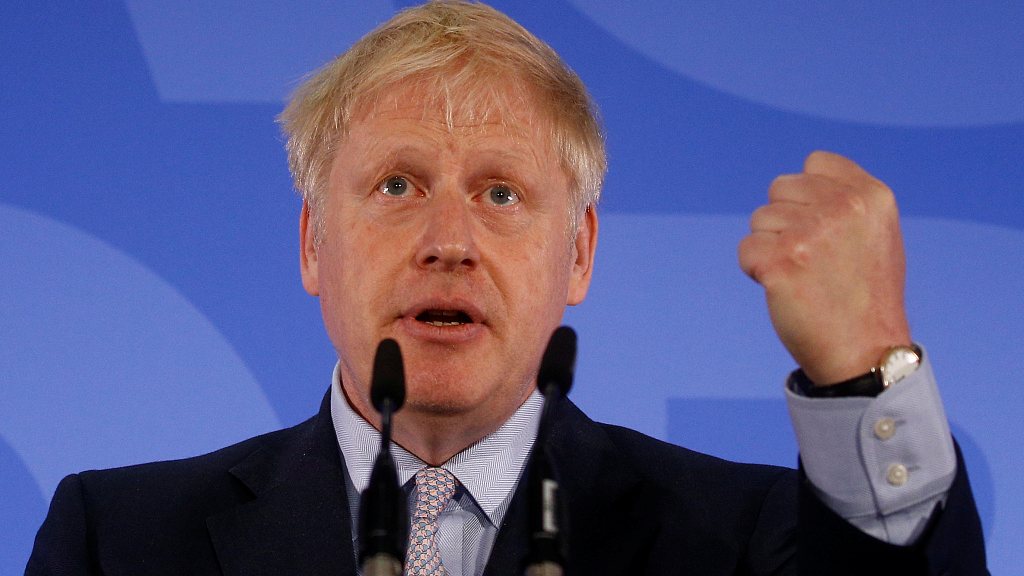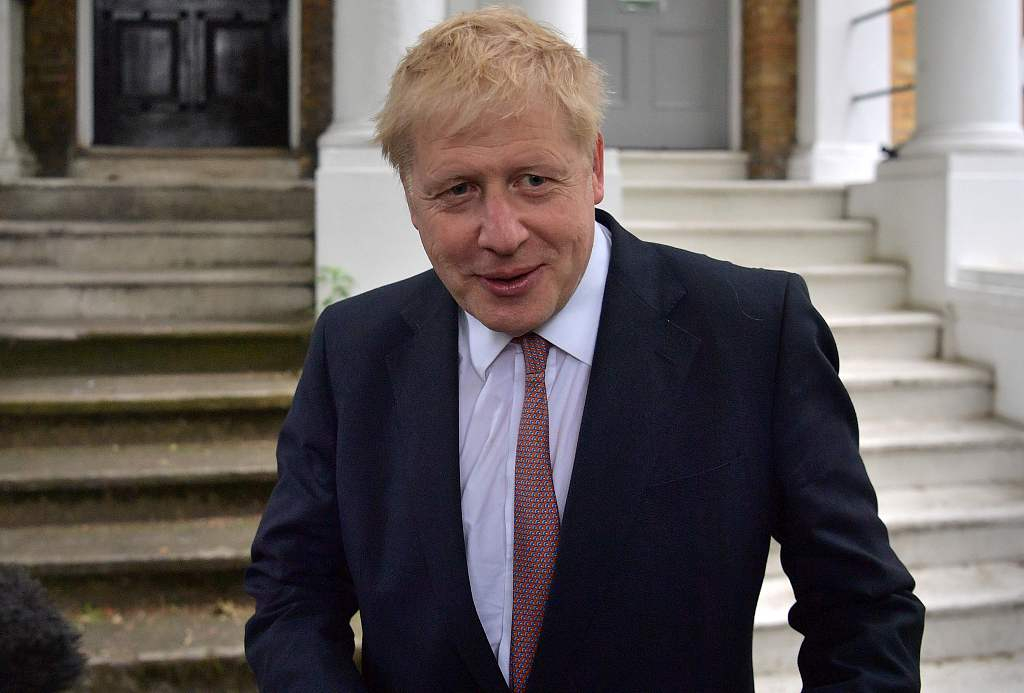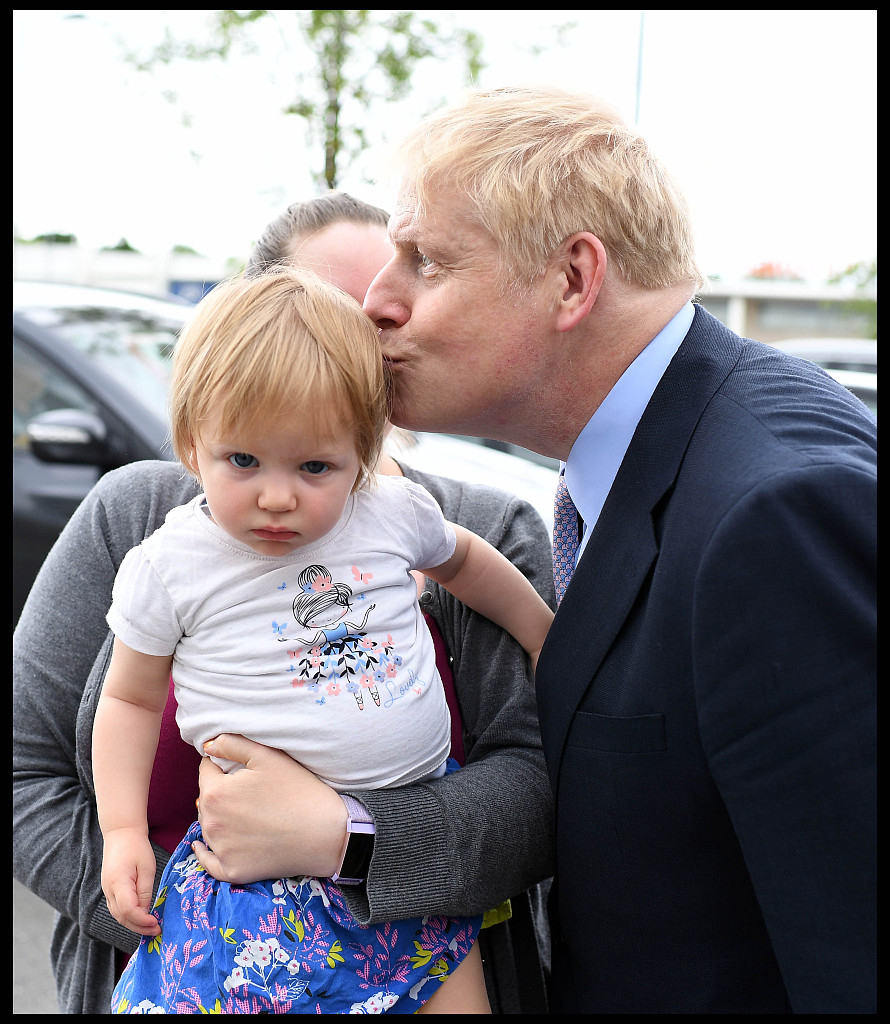

Editor's Note: Chris Deacon is a postgraduate researcher in politics and international relations at the University of London and previously worked as an international commercial lawyer. The article reflects the author's opinion, and not necessarily the views of CGTN.
On Sunday evening, the candidates for the next leader of the UK’s governing Conservative Party – and, therefore, prime minister position – took part in the first televised debate between them. All the remaining candidates, that is, other than Boris Johnson – the major favorite – who decided to skip the debate and was represented by an empty lectern. Will this harm or help his chances?
The party leader contest will be decided, initially, by fellow Conservative Members of Parliament, who will whittle the list of candidates down to a final two. These two candidates will then square off before the roughly 150,000 rank-and-file members of the Conservative Party.
At this stage of the contest – and during these debates – therefore, the candidates' initial primary motivation is actually winning over only a very small number of MPs. But they must also keep in mind the final party members' vote (many of whom will have been watching on television) and, ultimately, their national popularity for the purposes of any upcoming general election.

British Conservative MP Boris Johnson in London, June 7, 2019. /VCG Photo
One might assume, therefore, that all candidates would want to take part in debates in order to make their case to be leader. Boris Johnson, however, is in a somewhat different position to the other candidates in that he is currently the stand-out favorite among both MPs and party members. He has, therefore, taken the conventional favorite's approach of skipping a debate as there is simply no upside for him – only downsides.
There are still dangers in this approach for Johnson, however. While he is currently the firm favorite, the history of Conservative leadership contests is littered with examples of the favorite not winning. Johnson is, therefore, gambling somewhat that he can retain popularity without participating. This might be enough to get him into the final round, but there is a chance that it could backfire with party members, who could see him as aloof in his unwillingness to join the debate.
Being the only candidate to refuse to attend this first debate also gave all other candidates the opportunity to attack Johnson without him being able to respond and defend himself. In fact, however, this barely materialized during the debate. Early on, Foreign Secretary Jeremy Hunt complained that Johnson was not in attendance, stating that he should be there to answer the audience's questions. Rory Stewart – the dark horse candidate, consistently growing in popularity – also subtly quipped that he hoped "someone in this room" would become the next prime minister – i.e. not Boris Johnson.
But in one and a half hours of debate, these were the only real attacks on Johnson's lack of attendance, despite the constant reminder of his empty lectern on the stage. The likely reason for this is that all candidates are conscious that they do not want to engage in too many "blue on blue" attacks – that is, one Conservative attacking another. Whichever candidate is elected leader, the party will hope to rally round and unite under them. Having an overly aggressive leadership contest would likely undermine those aims.

British Conservative MP Boris Johnson kisses a child while campaigning in Peterborough, UK, May 31, 2019. /VCG Photo
Johnson, therefore, seems to have emerged relatively unscathed from his lack of attendance at this debate. His odds with the bookmakers remain rock solid and no other candidate performed so well as to pose a serious challenge to him at this stage.
This is only the first debate, however, and Johnson appears to have realized that he cannot escape them all. He is currently signed-up to take party in the next debate on Tuesday evening. Johnson’s team has perhaps assumed that, by that point, many of the candidates would already have dropped out, which would prevent a situation of them ganging up on him and allow him an easier ride. However, it seems possible that at least four – and possibly five – candidates could still be in the contest after the next vote.
Rory Stewart, in particular, is the standout candidate enjoying immense popularity among the public – something extremely rare for any Conservative MP, let alone a prospective leader. If he is able to gain enough MP votes to make it through to the next round – and importantly, therefore, the next debate – he could cause serious harm to Johnson's chances.
Stewart, and the other remaining candidates, may also be able to bring forward momentum they have built up in the first debate – something that Johnson will be lacking. Indeed, it could be in the second debate that he is most aggressively criticized for his lack of attendance at the first. Rather than now, this could be the moment that any harm from Sunday's lack of attendance begins to become apparent.
(If you want to contribute and have specific expertise, please contact us at opinions@cgtn.com.)

Copyright © 2018 CGTN. Beijing ICP prepared NO.16065310-3
Copyright © 2018 CGTN. Beijing ICP prepared NO.16065310-3